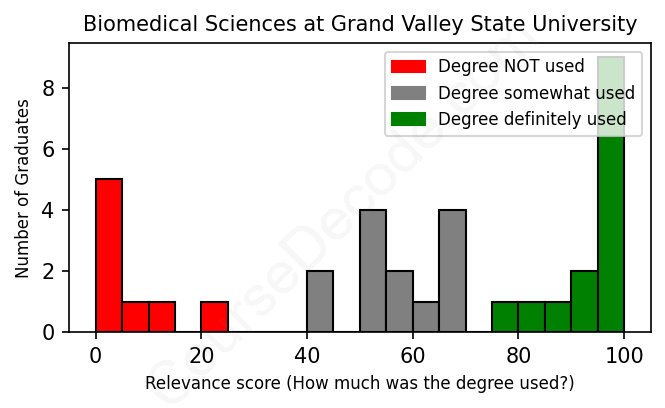
First, some facts. Of the Biomedical Sciences graduates from Grand Valley State University we've analyzed , here's how many have used (or NOT used) their degree in their career:

These are estimates based on AI analysis of 35 LinkedIn profiles (see below).
The verdict? Below average. Overall, with an average relevance score of 59%, Biomedical Sciences graduates from Grand Valley State University have a lower likelihood (-8%) of finding work in this field compared to the average graduate across all fields:
And for comparison, here's the chart for all profiles we've looked at across all degrees.
Also, after graduating, 45% of these graduates have pursued further education other than another Bachelor's degree (such as a Masters degree or other), compared to the average across all profiles of 35%. This suggests you may need more than just a Bachelors degree to be competitive as a Biomedical Sciences graduate.
See the details:
|
Relevance score: 100% We think this person has gone into a career highly relevant to their degree. We think this person has gone into a career highly relevant to their degree.
DEGREE INFOGraduated in 2021 from Grand Valley State University with a Bachelor of Science - BS in Biomedical Sciences. No other secondary education since. JOB HISTORY SINCE GRADUATIONNurse Technician - CTICU Spectrum Health Oct 2021 - Aug 2022 Nurse Technician - Butterworth Emergency Department  Spectrum Health Oct 2021 - Aug 2022 Physician Assistant Student  Western Michigan University Aug 2022 - Present ABOUTGraduated from Grand Valley State University with a major in Biomedical Science and minors in Biology and Psychology. Continued my education at Western Michigan University earning a Master's degree in Physician Assistant Studies. |
The top 10 most common jobs done by the graduates we've analyzed (ranked most common to least) are:
After looking through the various jobs held by graduates from Grand Valley State University with degrees in Biomedical Sciences, it's clear there are a few common threads. Many graduates find their way into roles that loosely connect to the biomedical field, such as pharmacy technicians, nursing assistants, or clinical roles like physical therapy. These positions typically require some level of biomedical knowledge or skills, making them a decent fit for what they studied. On the other hand, there are also quite a few graduates who venture into entirely unrelated careers, like project management, sales, or even banking. These kinds of jobs don’t leverage the specialized knowledge gained from their degree, leaving them feeling more disconnected from their academic backgrounds.
Overall, while a number of jobs definitely align well with Biomedical Sciences – such as Physician Assistants, Resident Doctors, and Clinical Pharmacists – many graduates also seem to be taking paths that don't fully utilize their degree. This disparity suggests that while a Biomedical Sciences degree can open doors in healthcare and medical research, it's also not a strict determinant of career trajectory. Graduates might find themselves in a mix of relevant and irrelevant roles, particularly if they choose to explore options outside of direct biomedical applications. If you're a high school student considering this field, it's important to think about where you want to go with your degree and how it might connect to the jobs you’re interested in down the line.
Here is a visual representation of the most common words in job titles for Biomedical Sciences graduates (this is across all Biomedical Sciences graduates we've analyzed, not just those who went to Grand Valley State University):

Graduates from Grand Valley State University with a degree in Biomedical Sciences seem to have diverse career paths, especially in the healthcare and sciences sector. Many of these individuals start their careers with roles in clinical settings such as nursing technicians, pharmacy interns, or clinical research coordinators shortly after graduation. This is pretty typical for Biomedical Sciences graduates, as they often pursue positions that allow them to gain hands-on experience in healthcare or research. A fair number pursue further education or specialized training, leading to roles like physician assistants, clinical pharmacists, and even surgeons or researchers over time. It’s encouraging to see that some have secured positions in reputable organizations, such as hospital systems and research institutes, fairly early in their careers.
As time progresses, about five to ten years post-graduation, many of these alumni transition into more advanced positions, often aligning closely with their Biomedical Sciences background. You’ll find them in roles such as project managers in healthcare construction, clinical pharmacists, and even in analytical positions within organizations like the CDC. However, not everyone progresses directly into relevant roles based on their degree. Some graduates might find themselves in careers less connected to their field—like sales, project management in construction, or even teaching—indicating that while a Biomedical Sciences degree offers a strong foundation, the path taken can vary greatly. Overall, there's a solid representation of relevant careers within the field, with many graduates doing well in healthcare or research, which is a positive takeaway for prospective students considering this path.
Getting a Bachelor’s degree in Biomedical Sciences can be pretty challenging, especially if you're diving into all the science and math classes. At Grand Valley State University, like many places, you'll be studying subjects like biology, chemistry, and anatomy, which can really test your understanding and dedication. It can be more demanding than some other degrees because of the heavy coursework and lab work involved. However, if you have a genuine interest in the sciences and are willing to put in the effort, you’ll find it rewarding too. So, while it’s not a walk in the park, with the right mindset and commitment, you can definitely handle it!
Most commonly, in the LinkedIn profiles we've looked at, it takes people 4 years to finish a Bachelor degree in Biomedical Sciences.
So, looking at these graduates from Grand Valley State University, it seems like they’re doing pretty well overall, especially in the healthcare and engineering fields, which often pay decently. A lot of them have managed to snag roles like Project Manager, Clinical Pharmacist, and Physician Assistant, all of which typically offer good salaries. On the flip side, some started off with positions that might not be as lucrative, like teaching or entry-level roles in sales and support. Still, many have moved up the ladder or pivoted into better-paying jobs over time. Overall, while the pay might vary quite a bit depending on the specific job and experience level, it looks like most are on a path to making decent money as they gain experience and advance in their careers.
Here is a visual representation of the most common words seen in the "about" section of LinkedIn profiles who have a Bachelor degree in Biomedical Sciences (this is across all Biomedical Sciences graduates we've analyzed, not just those who went to Grand Valley State University). This may or may not be useful:

Here are all colleges offering a Bachelor degree in Biomedical Sciences (ordered by the average relevance score of their Biomedical Sciences graduates, best to worst) where we have analyzed at least 10 of their graduates:
| College | Score | Count |
|---|---|---|
 Western Michigan University Western Michigan University
|
81 | 17 |
 Marquette University Marquette University
|
78 | 29 |
 University of Michigan University of Michigan
|
77 | 10 |
 Colorado State University Colorado State University
|
77 | 19 |
 University at Buffalo University at Buffalo
|
75 | 18 |
 California Polytechnic State University-San Luis Obispo California Polytechnic State University-San Luis Obispo
|
74 | 13 |
 University of Connecticut University of Connecticut
|
74 | 15 |
 Texas A&M University Texas A&M University
|
73 | 59 |
 Auburn University Auburn University
|
71 | 26 |
 Northern Arizona University Northern Arizona University
|
71 | 15 |
 Rensselaer Polytechnic Institute Rensselaer Polytechnic Institute
|
70 | 10 |
 University of Central Florida University of Central Florida
|
69 | 26 |
 University of South Florida University of South Florida
|
68 | 48 |
 Georgia Institute of Technology Georgia Institute of Technology
|
67 | 41 |
 The Ohio State University The Ohio State University
|
64 | 14 |
 Rochester Institute of Technology Rochester Institute of Technology
|
64 | 12 |
 Case Western Reserve University Case Western Reserve University
|
63 | 12 |
 Grand Valley State University Grand Valley State University
|
59 | 35 |
 Arizona State University Arizona State University
|
58 | 12 |